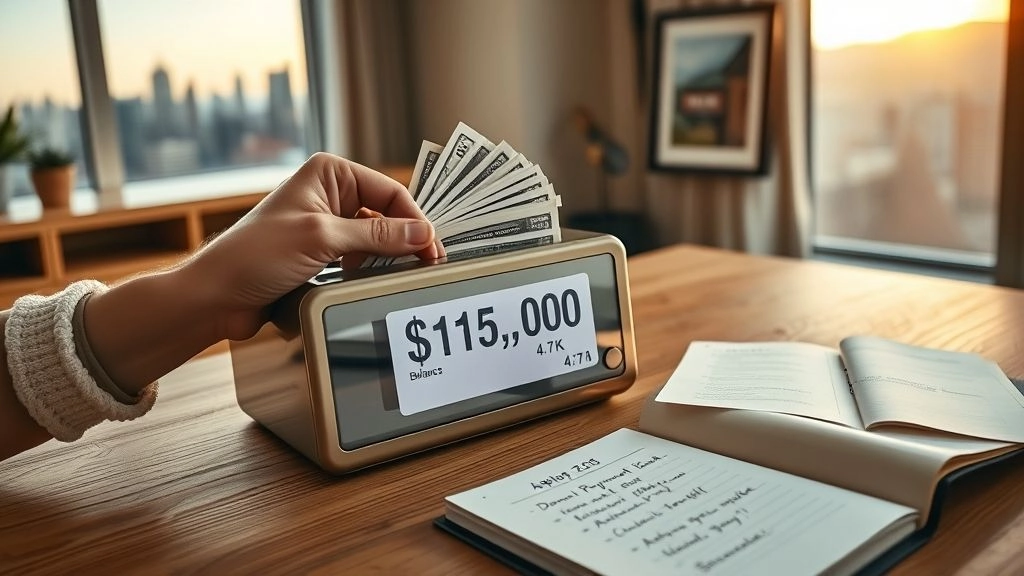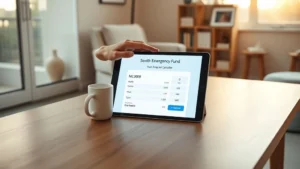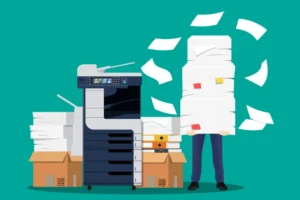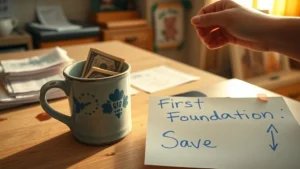This Gets Real Fast
Let’s just start with a feeling: imagining your name on a mailbox… and then looking at your bank account and realizing takeout, lattes, and those “how did I spend that much on Amazon?” moments are stealing your home dream one day at a time. If you’ve ever had a moment where the excitement spiraled into “How do I stop my savings from slipping through my fingers?”—well, hey, you’re not alone. I’ve been there, watching my down payment blend into the mess of bills and pizza crust receipts, completely unsure where—literally—my house money should live to stay safe and (maybe) even grow.
No textbook answers here. Just me, sipping coffee, telling you what I wish I’d known a couple years ago about where should I keep my money while saving for a house. Because nobody wants to outsmart themselves with savings, and—spoiler—you do not need to become a finance bro to make a smart move.
Start With Your Timeline
Are You Buying Soon…Or Someday?
Alright, let’s get personal. Are you hoping to go house-hunting in the next year or two? Or is your dream a “maybe five years or more” situation? (No judgment—some of us are still convincing partners or wrestling student loan dragons.)
This is huge, because the safest spot for your money depends almost entirely on how fast you’ll need it. Found myself googling this: “is it stupid to just use a savings account?” Turns out, you’re smarter than you think if you want safety when that moving truck date is close.
Short Timeline: Say, 1-2 Years?
If you’re getting serious, experts everywhere—from real-life Reddit threads to Fidelity’s house-saving tips—pretty much agree: Don’t invest in stocks. Don’t chase Bitcoin dreams here. The market is a wild see-saw and…well, I’m guessing you don’t want your $15,000 down payment to turn into $9,000 if markets wobble (and you finally find that dream cottage).
HYSAs (High-Yield Savings Accounts) and CDs (Certificates of Deposit) are the hero accounts for this. But which one? Let’s break it down.
HYSA vs. CD: The Showdown
What Even Is a HYSA?
Imagine your plain ol’ savings account got a promotion. That’s a HYSA—offering interest rates around 4–5% these days, compared to maybe 0.05% at your childhood bank (not throwing shade at local banks, but facts are facts). Your money grows faster, and you can get to it anytime, no drama.
Table: HYSA vs. CD, Straight Talk
| Account Type | Interest Rate | Can You Withdraw? | Can You Add Money? |
|---|---|---|---|
| HYSA | Variable (4–5% APY) | Yes, any time* | Yes, anytime |
| CD | Fixed (often 0.3–0.5% higher than a HYSA) | Only at maturity (or pay penalty) | Just one initial deposit usually |
*Some banks limit how many times you can pull money out each month—read that fine print.
Why HYSAs Are Easy-Mode
Think of a HYSA as “quick escape” parking for your cash. You’re earning actual interest, and you don’t have to plan withdrawals months in advance. Even if inflation’s snacking at your savings, you’re still way ahead of stuffing bills under your mattress. I moved my first $5K to a HYSA and watched the interest add up faster than my old account—all while still being able to snatch it back if my dream house popped up on Zillow at 3am.
CD Pros & Cons (in Real Life Terms)
CDs are the “committed relationship” of savings. You pick a term—maybe 6, 12, or 24 months—lock in your rate, and can’t touch it without paying a penalty. (Annoying, yes, but sometimes a good thing if you have grabby hands like I do.) If rates drop during your term, you win. If rates go up…eh, you might feel locked out. According to people way smarter than me at Fidelity, “a bank’s best available CD rate is often a little higher than their best HYSA APY, but you lose flexibility.” Fair.
I tried a 1-year CD once. Saving for a house down payment in 6 months? “No problem,” I thought—then my lease ended early, and I lost a chunk to penalties moving the cash. Rookie move. So ask yourself: Am I 100% sure when I’ll need this money?
Longer Timeline, More Options
Saving for the Long Haul…with Caution
If you’re more how to save for a house in 5 years than “I need to buy yesterday,” you get a luxury: more time = more ways to potentially grow your money. But…with a dash of risk thrown in.
Some folks split their funds—a bit in good old safe HYSAs/CDs, some in mutual funds or even stocks. The theory? The market might wobble like a toddler, but over 5+ years, odds are your money could grow a lot faster than in “just” a savings account. (My cousin did this—she’s a risk-taker; I, on the other hand, still keep receipts for socks…)
If you’re saving for a house while renting and worried about stretching every dollar, stay cautious. Hybrid approaches are fine—a small slice in investments, but NOT most of your house fund, please. The last thing you want is for markets to crash the year you finally made it to an open house.
Money Market Accounts: That Middle Child
Ever heard of a money market account? They’re like savings accounts with a tiny side of checking—usually pay rates and offer checkwriting. Useful if you like the idea of a separate “house” account with easy access, and sometimes they pay as well as the best HYSAs (Vanguard’s money market guide lays this out clearly).
Pro Moves to Make Your Savings Stick
Automate Everything (Seriously)
This is, no lie, the biggest “hack” there is. When I finally set up automatic transfers to my separate house fund, I stopped spending the money before it even landed. Out of sight, out of mind, into the savings account. I even set my password to “FutureHome2027″—not kidding. It helped. How to save for a house down payment in 6 months covers more ways to move fast if you’re doing a sprint rather than a marathon.
Even the experts say: “Set it and forget it”—it’s cheesier than reality TV but it works. Every paycheck, even $50–$100, keeps your dream alive without daily guilt.
Clever Budget Tricks
You’re probably already cutting Netflix and skipping Target runs (I see you, pretending you’re “just browsing”). But also hunt down windfalls—tax returns, birthday money, bonus checks. Throw every cent into your house fund. The fastest growth I ever had? A random freelance check that went straight into my HYSA and covered half my closing costs six months later.
If you’re in the tight-budget crew, don’t underestimate small wins. For a deeper dive, how to save money for a house on a low income is full of tips that actually work when the numbers don’t look promising at first glance.
Temptation-Proofing Your Savings
Let’s be honest…sometimes it’s too easy to dip into the house fund for just one concert ticket or a “totally necessary” impulse purchase. HYSA helps (it’s not right in your checking account). But some people go ninja—open an account at an online bank with no ATM card so it’s a real hassle to touch it. Out of sight, out of swipe.
What About Investing? (The Risky Stuff)
Should You Ever Invest House Money?
If you’ve got five years or more, maybe. If you really know your risk tolerance and have backup plans. But the common wisdom from sources like Nerdwallet and every Reddit thread is: “If you need your money soon, keep it safe.” Don’t gamble your oasis-away-from-landlord land money just for an extra percent or two of return. Timing is a beast you can’t tame.
If you feel left out of the “get rich” hype—don’t. No one posts about the year their house fund tanked because they chased the market. Save boring; celebrate big later.
Real-Life Example Time
Okay, here’s a bit about my friend Amber. She lived on a shoestring, renting, always feeling a step behind. She started with just $500 in a HYSA, automating $50 from every paycheck. She picked up an extra gig during the holidays and sent her entire tax refund straight to her house fund. Three years later, she finally had enough for her first down payment—right after finding How to save for a house in 5 years and printing out the checklists. She said it wasn’t about “getting rich”—it was about keeping her system so simple she couldn’t mess it up.
Your Money, Your Move
Where should I keep my money while saving for a house? It sounds so technical, but really—it’s about setting yourself up to win, no matter what life (or Zillow) throws at you. If you want sleep-at-night safe: HYSAs for flexibility, CDs if you can lock it in and won’t touch it, and for the very long game…maybe a sprinkle of investments. Automate everything, tempt yourself less, and celebrate the small wins. (Don’t sleep on windfalls!)
Most of all: don’t get paralyzed by choice. Decide where to park your first $100. Or send $20 right now if that feels big. Maybe write your “house account” goal on a sticky note and stick it to your debit card. Small moves add up. Over time, it’s doable. You get to make your version of a home happen—messy, imperfect, but very real.
If you need more ideas for how to make your savings grow faster or for getting creative on a low income, check out how to save money for a house on a low income—I promise, it’s full of relatable advice for those “is this even possible?” nights.
You’re not alone in this. Take it one decision, one dollar, one tiny step at a time. The mailbox dream is so much closer than it sometimes feels. Seriously…you’ve got this.













